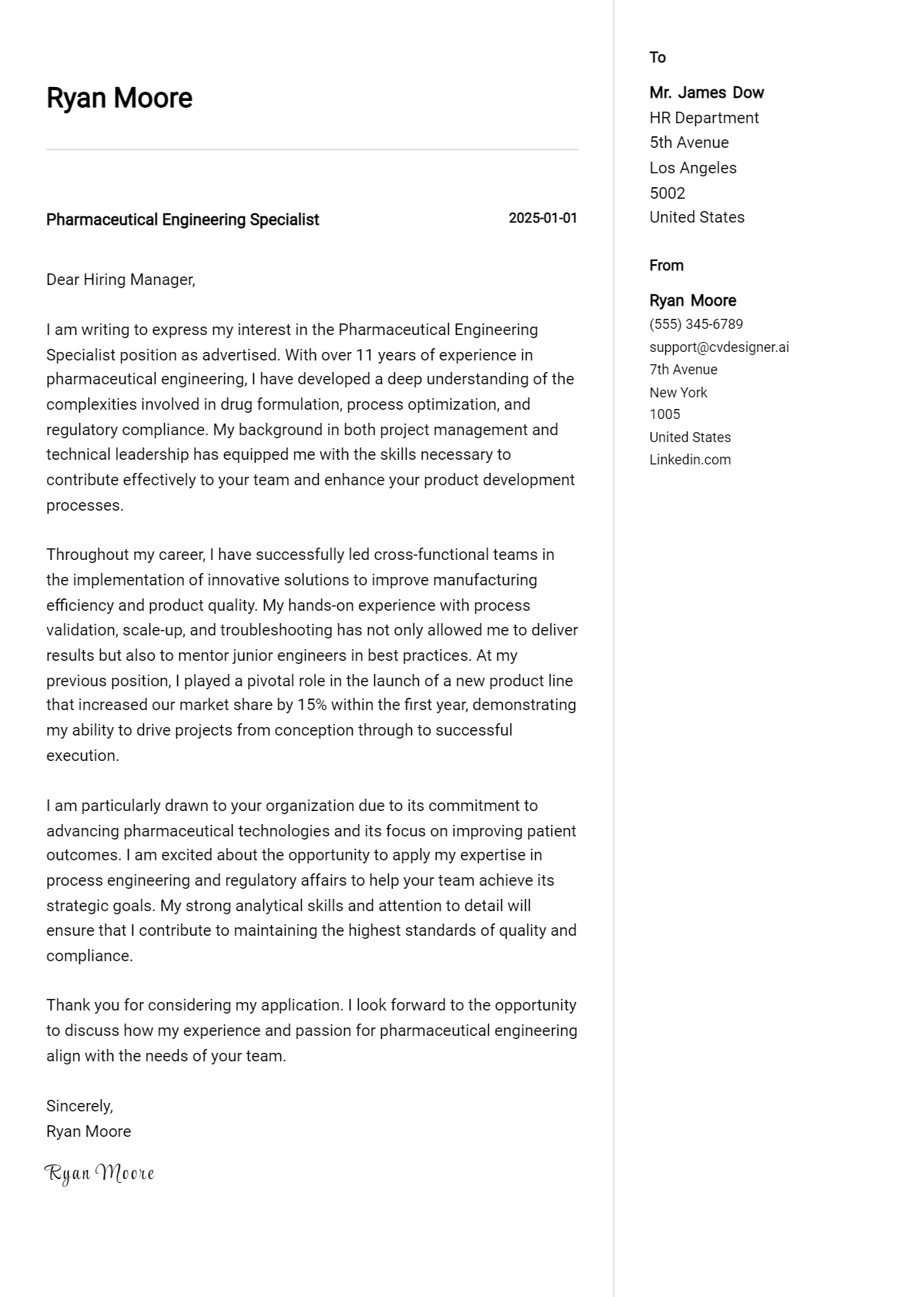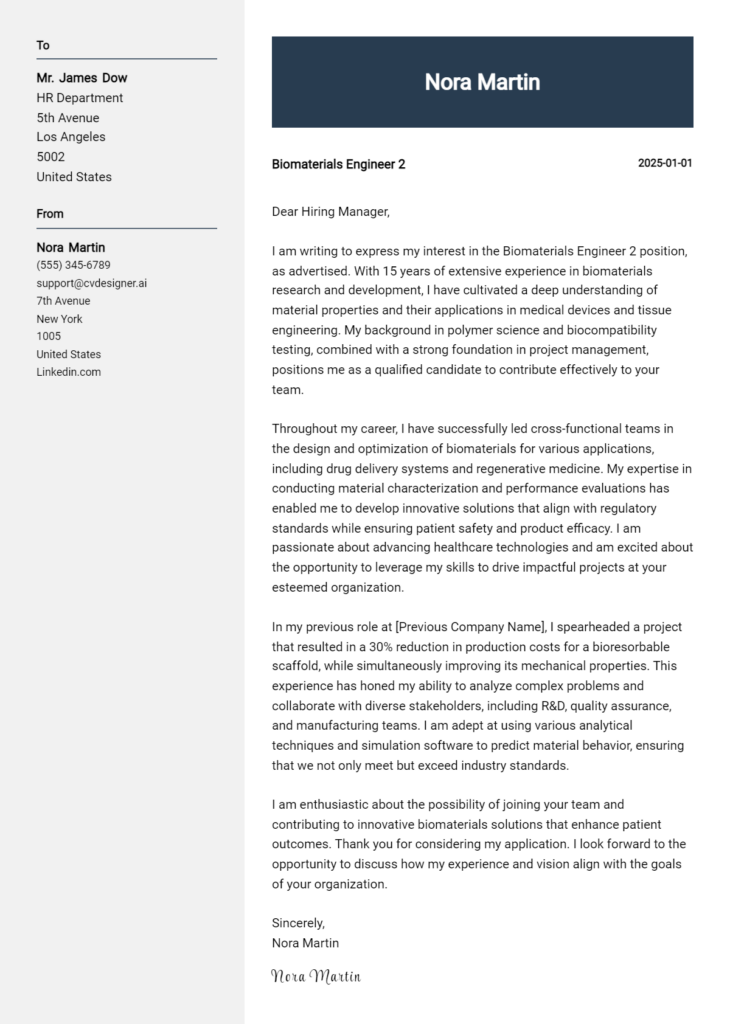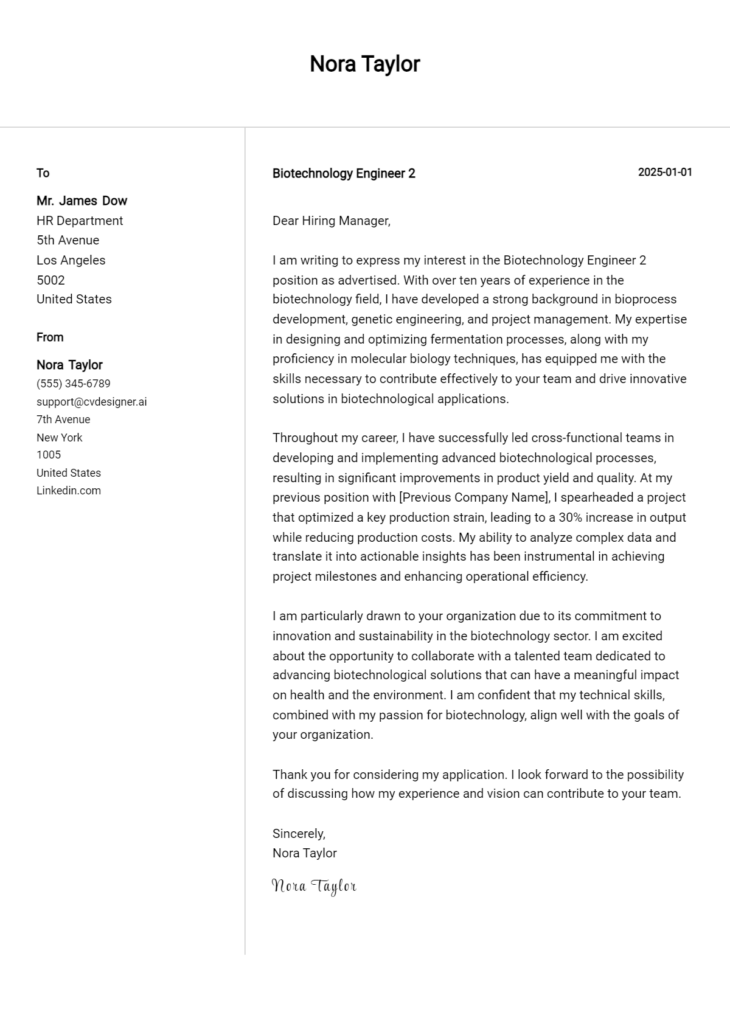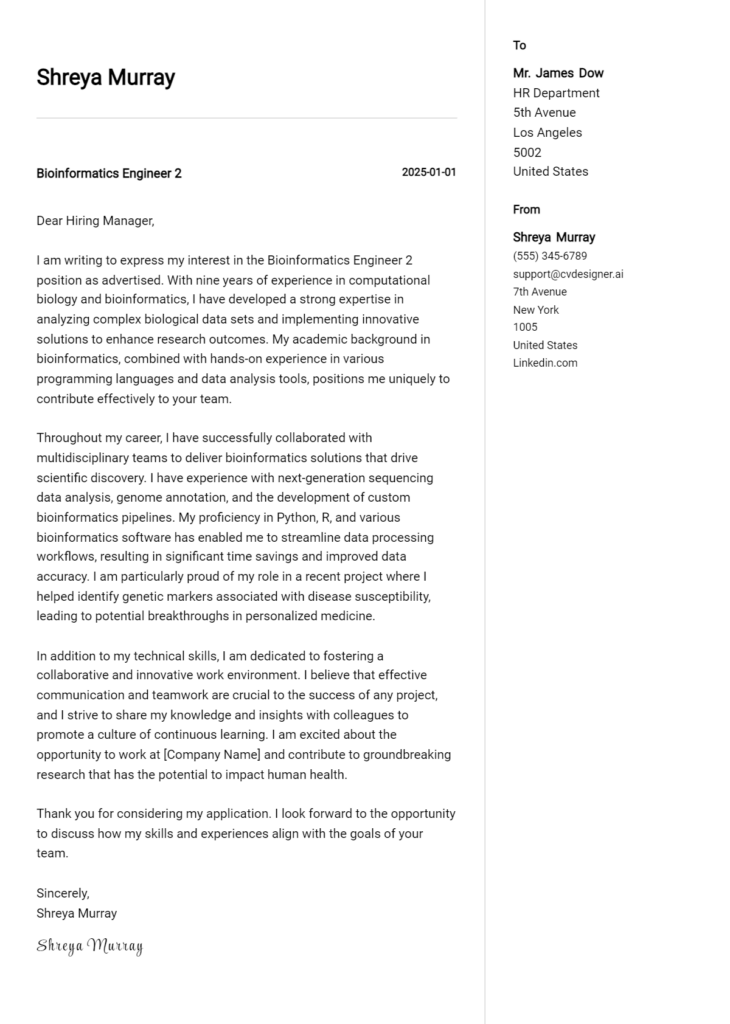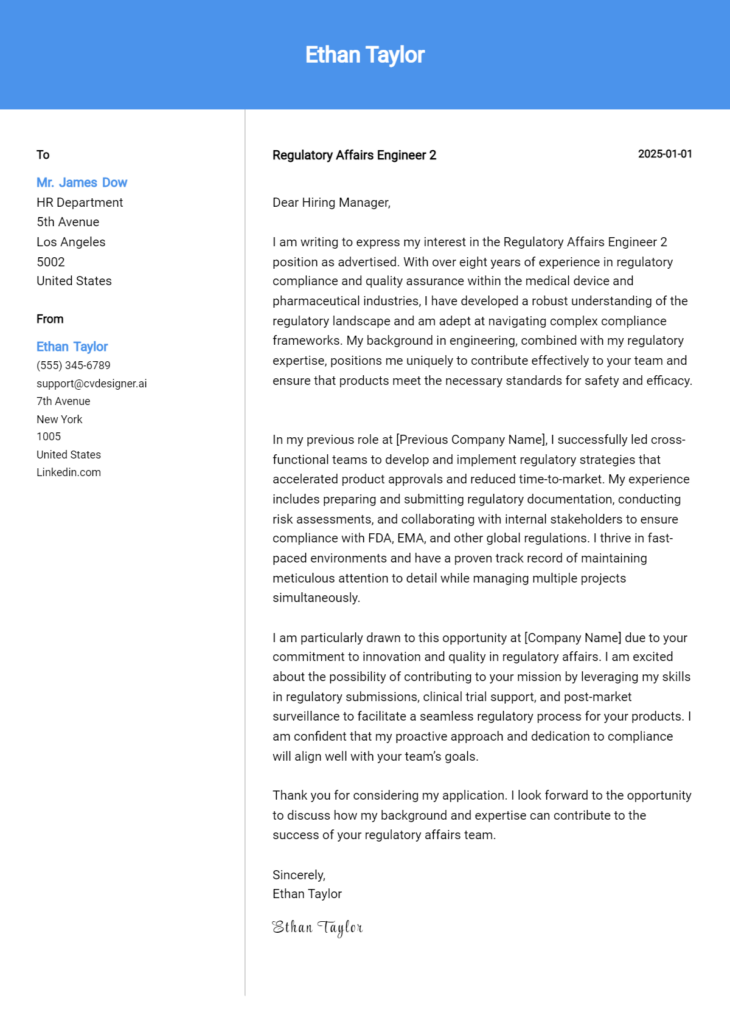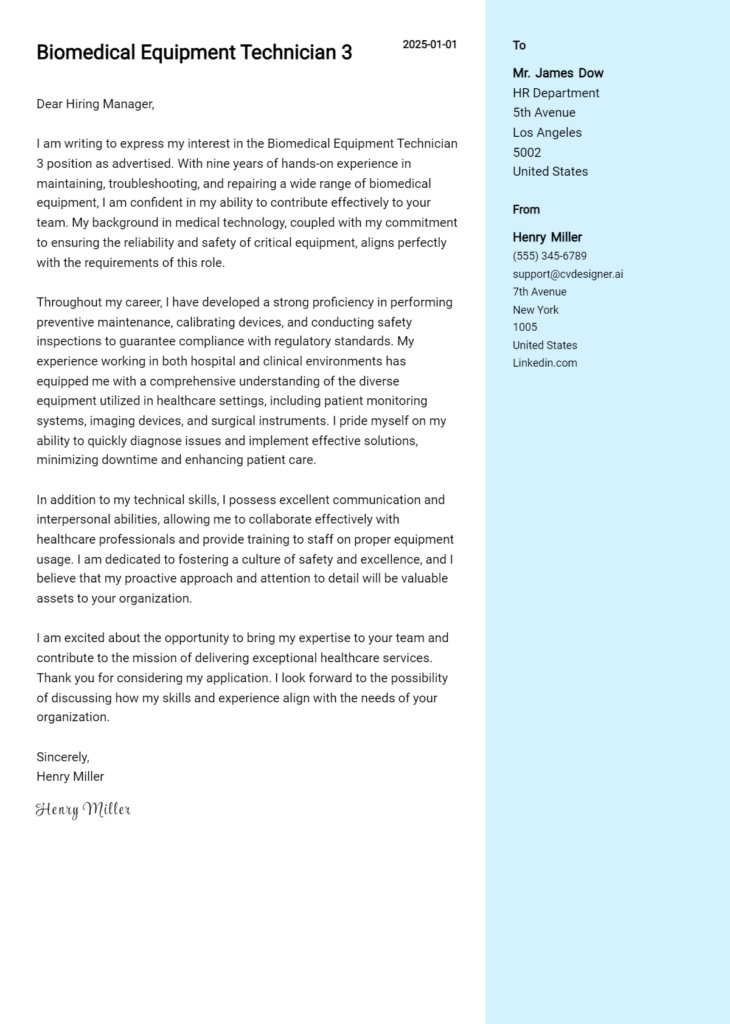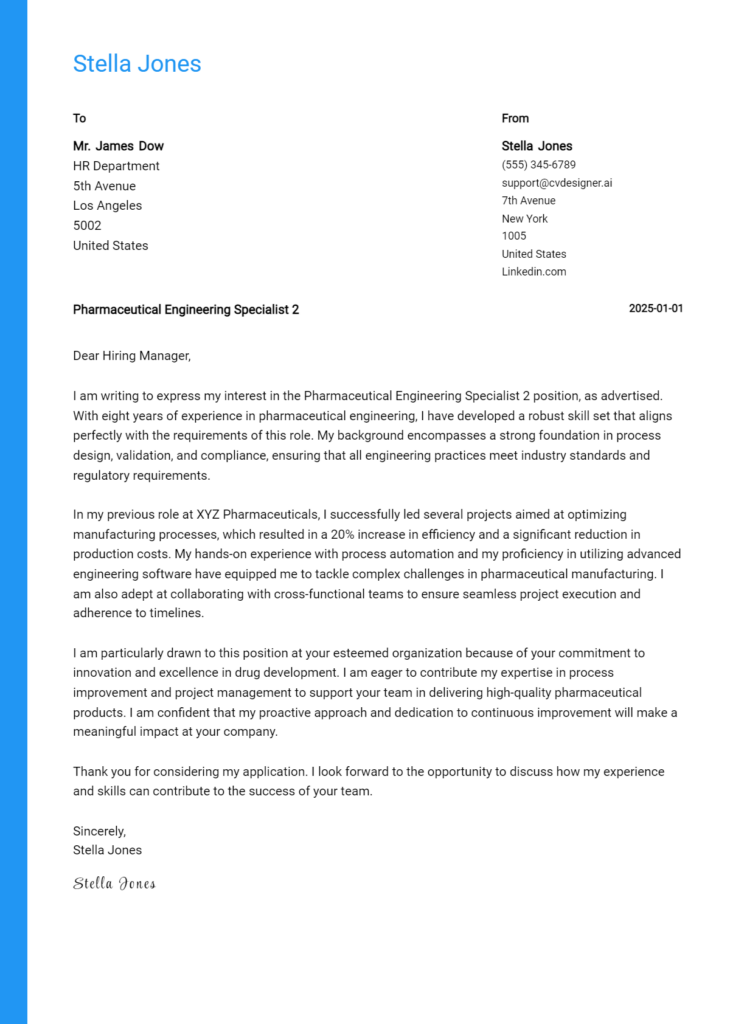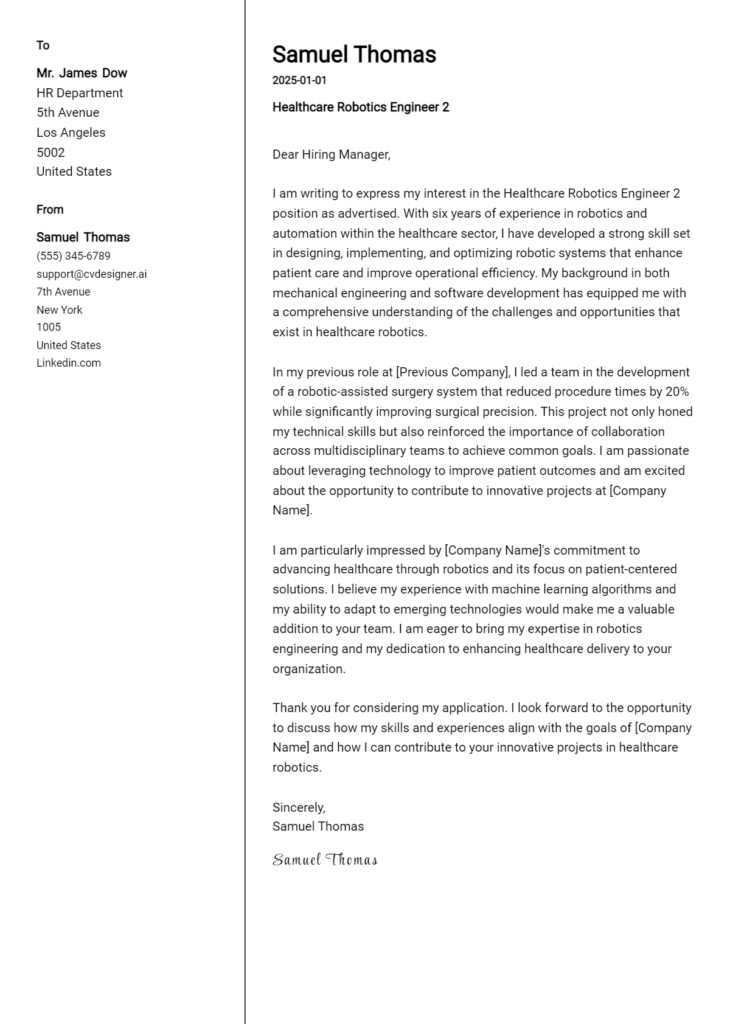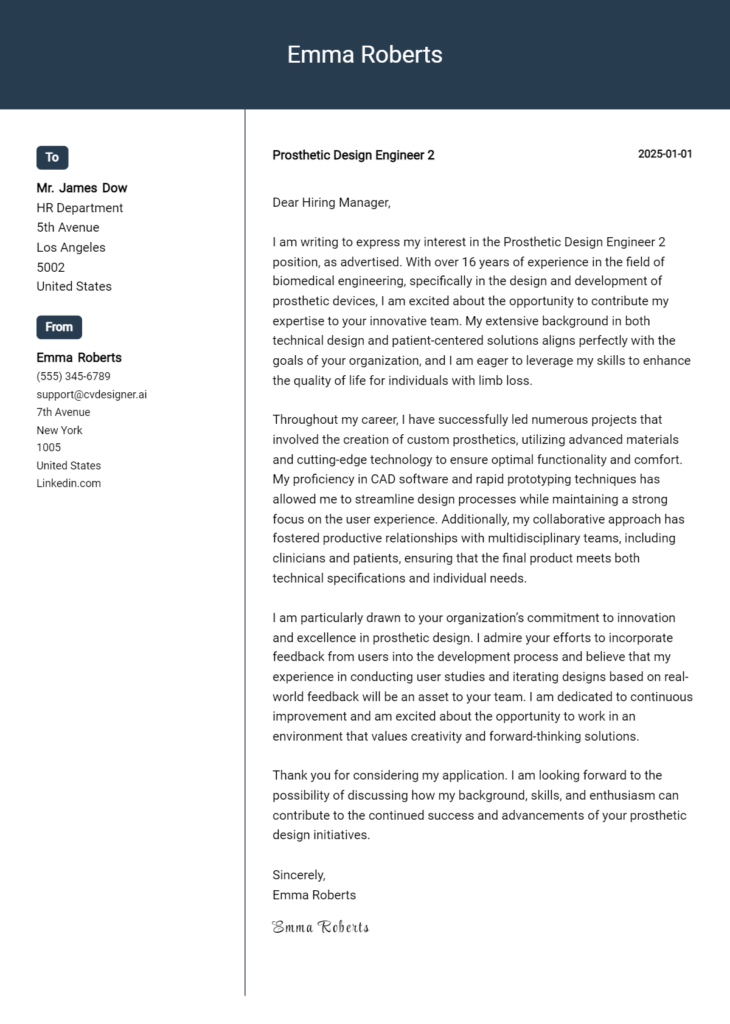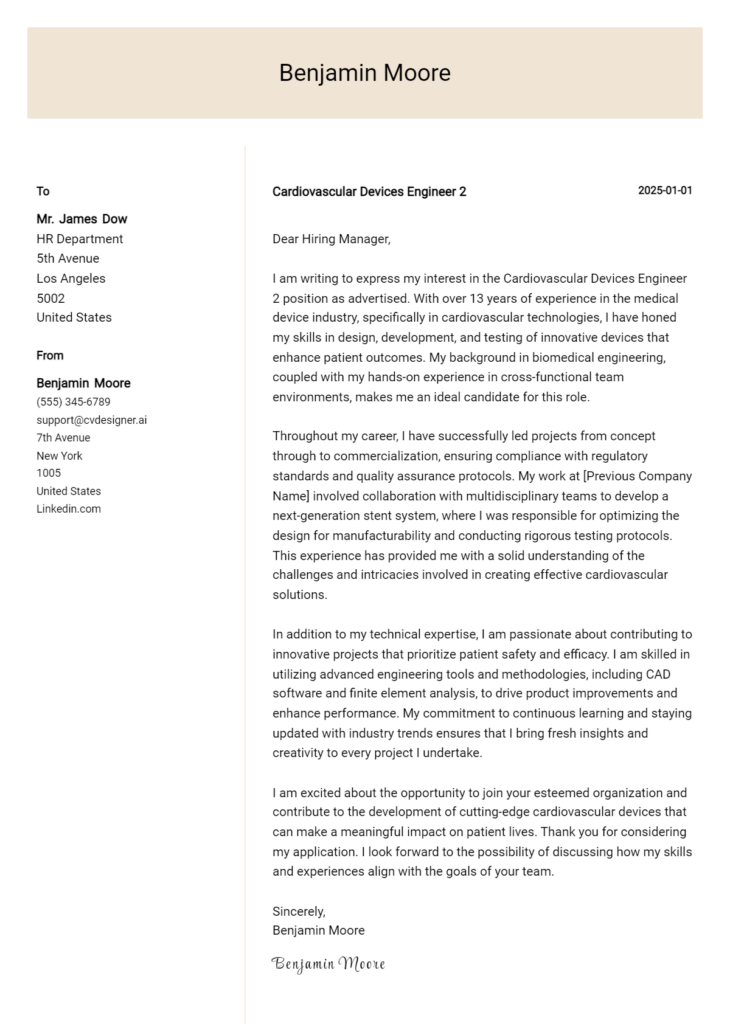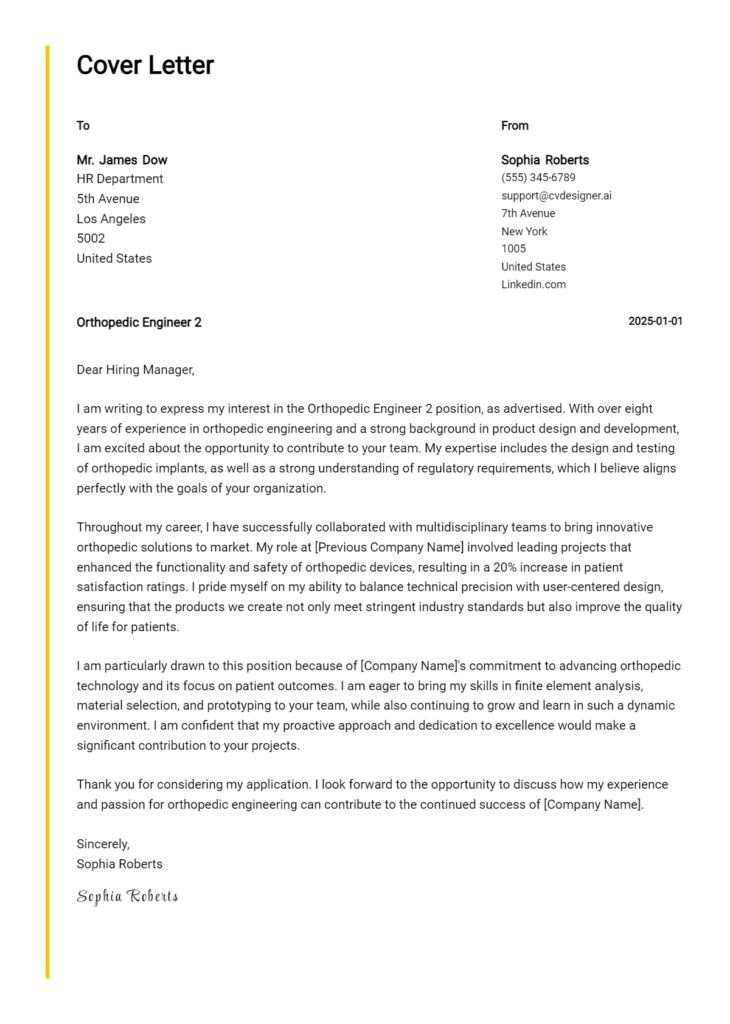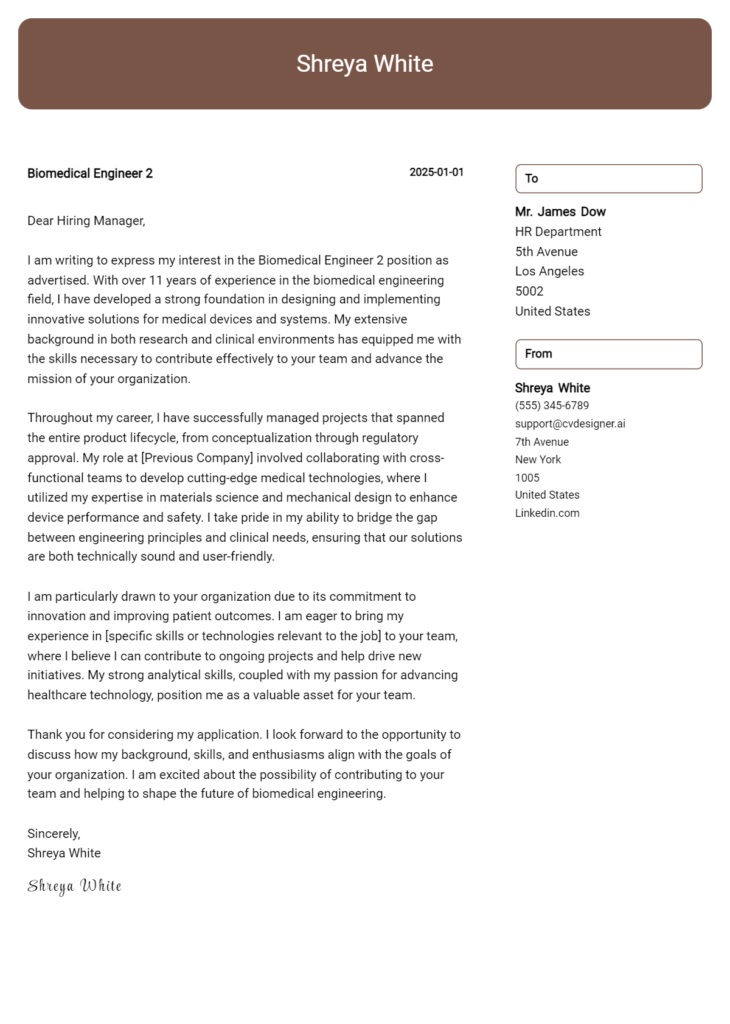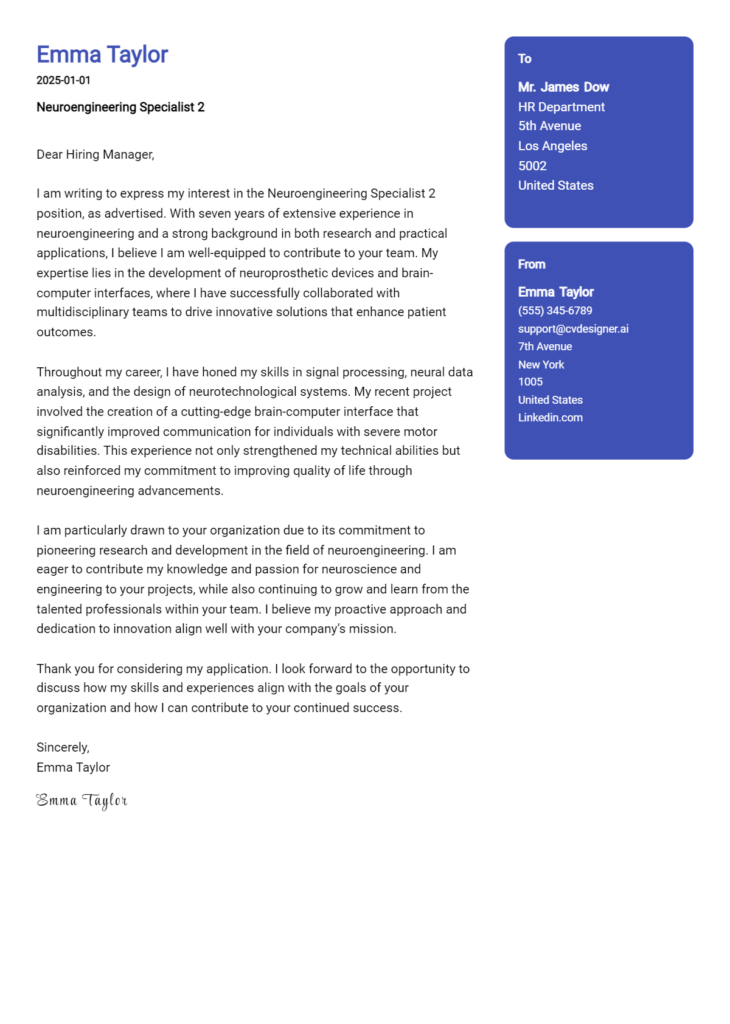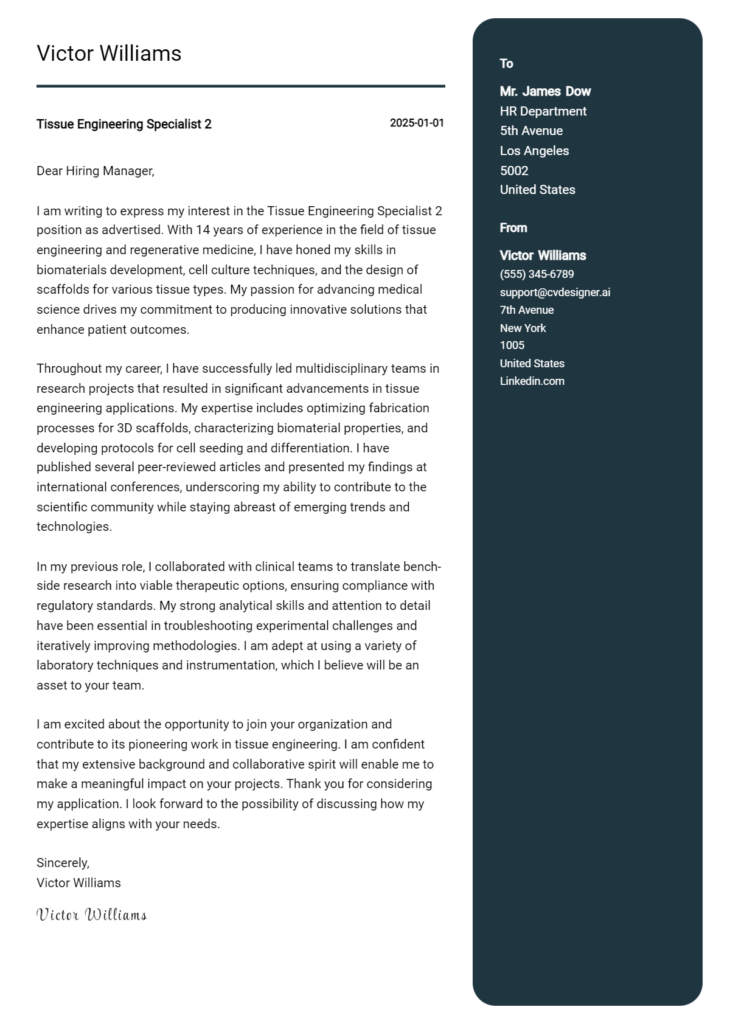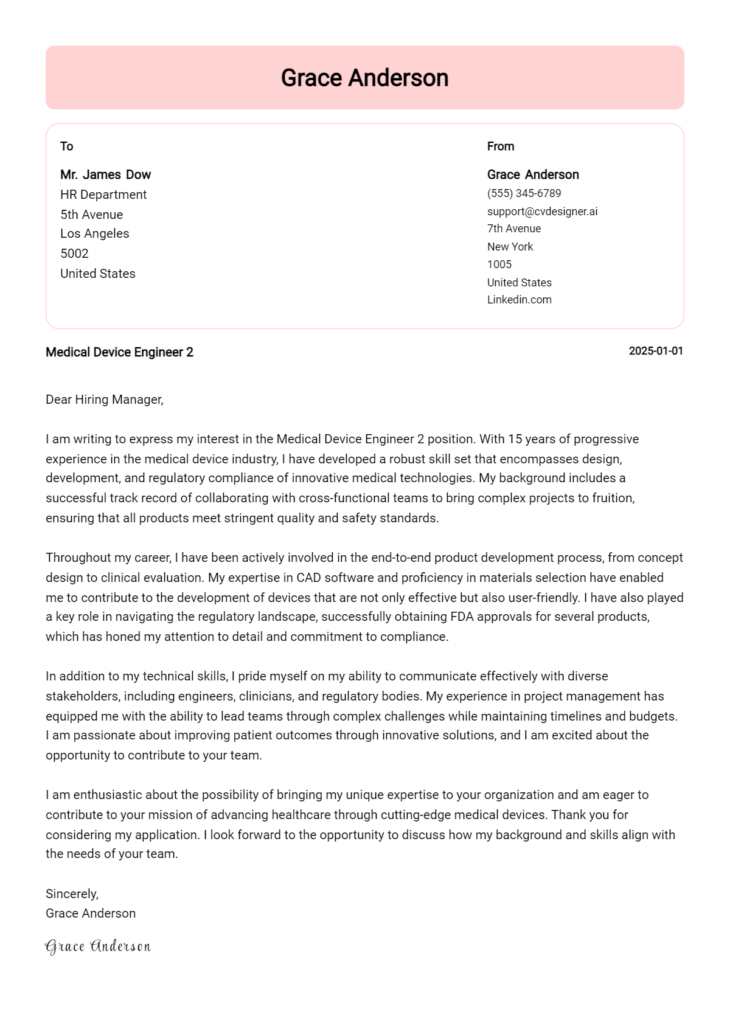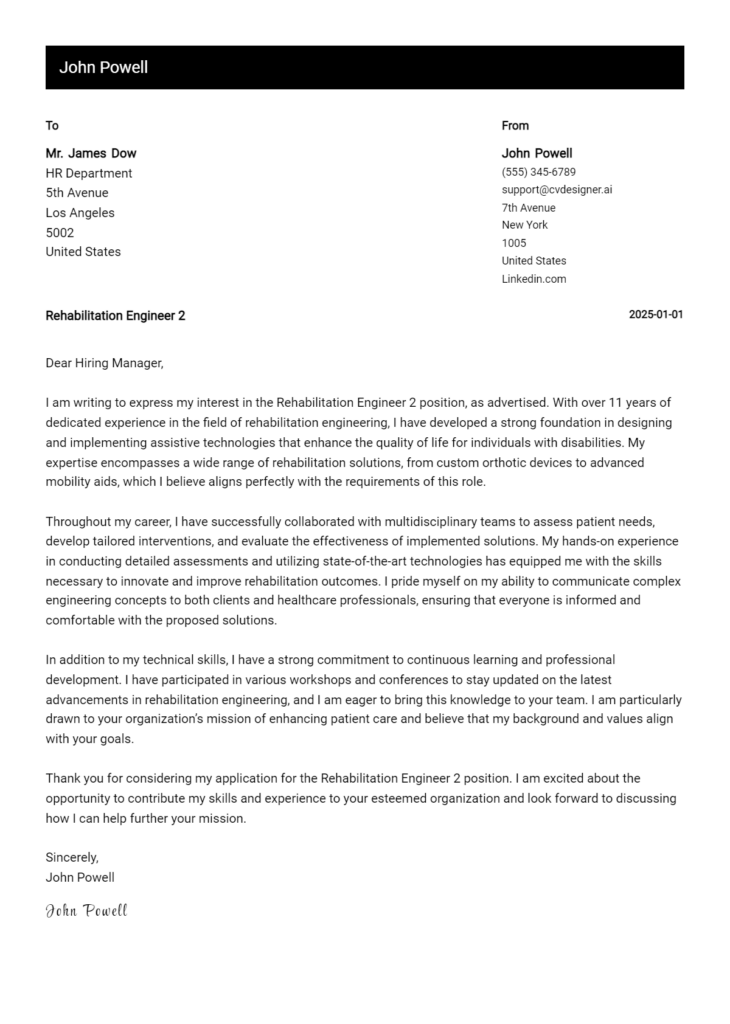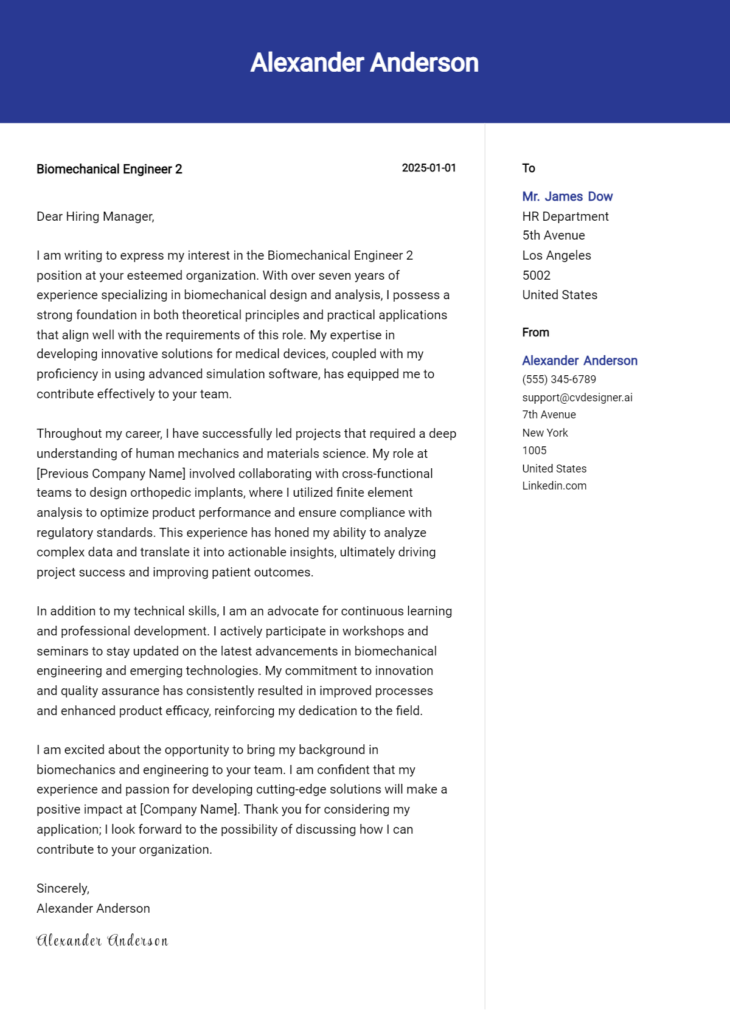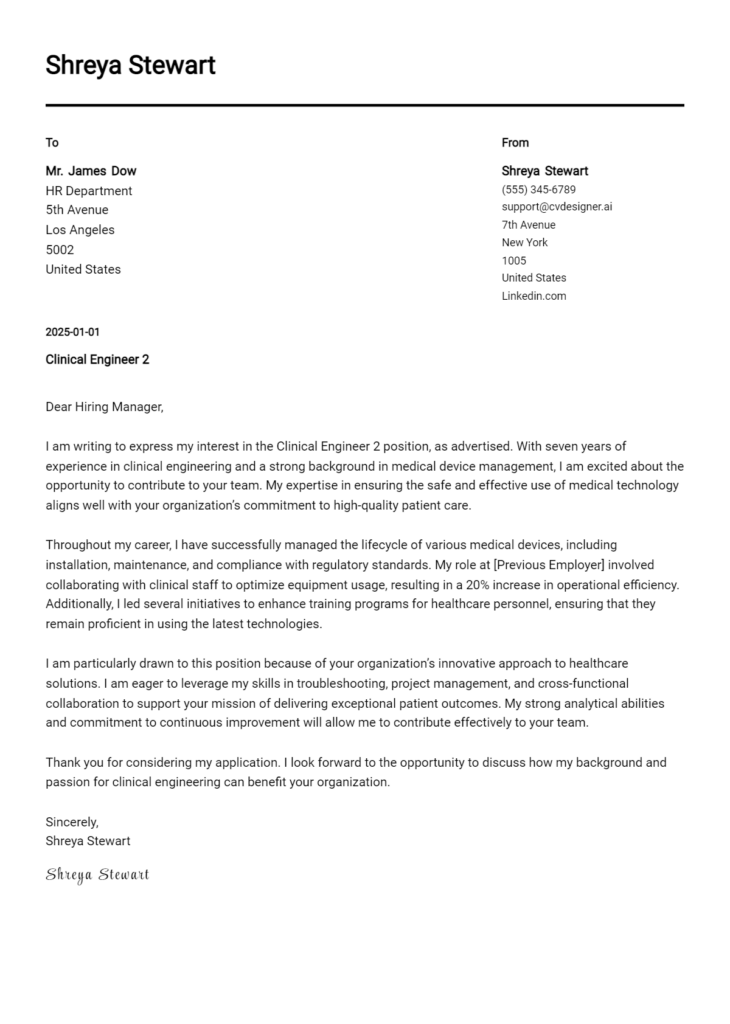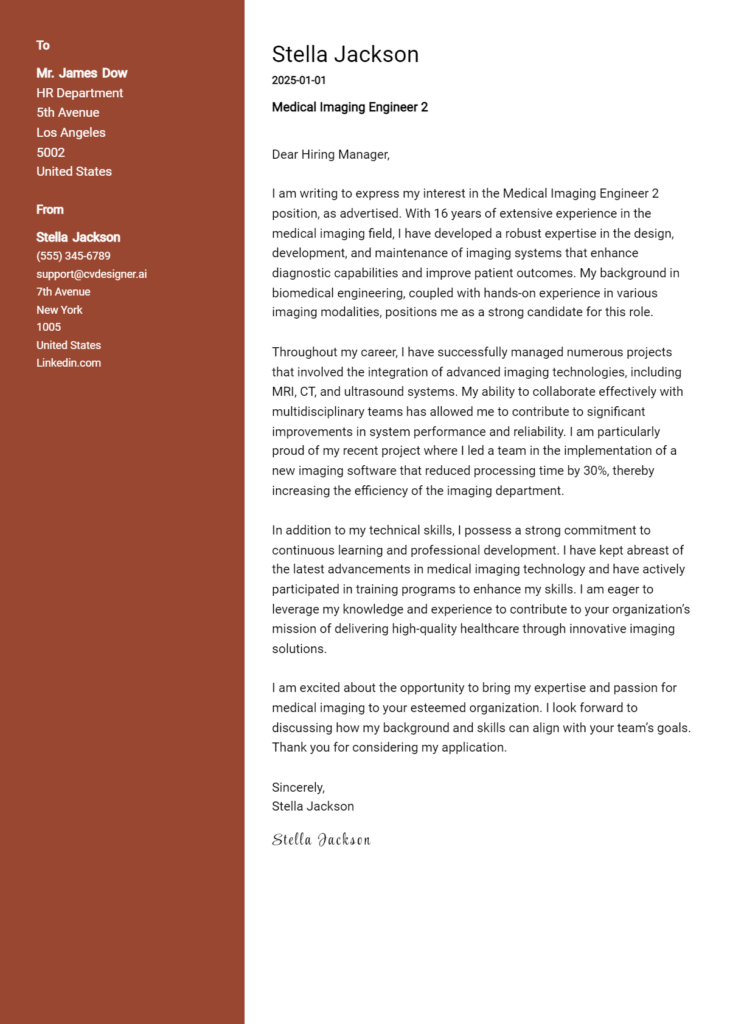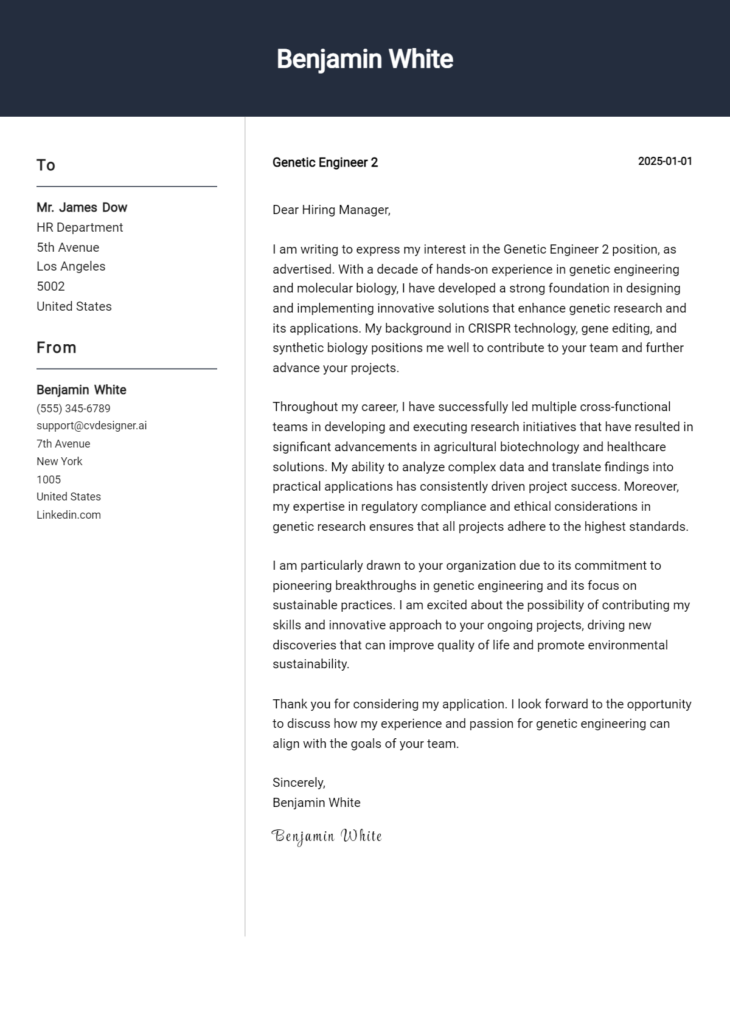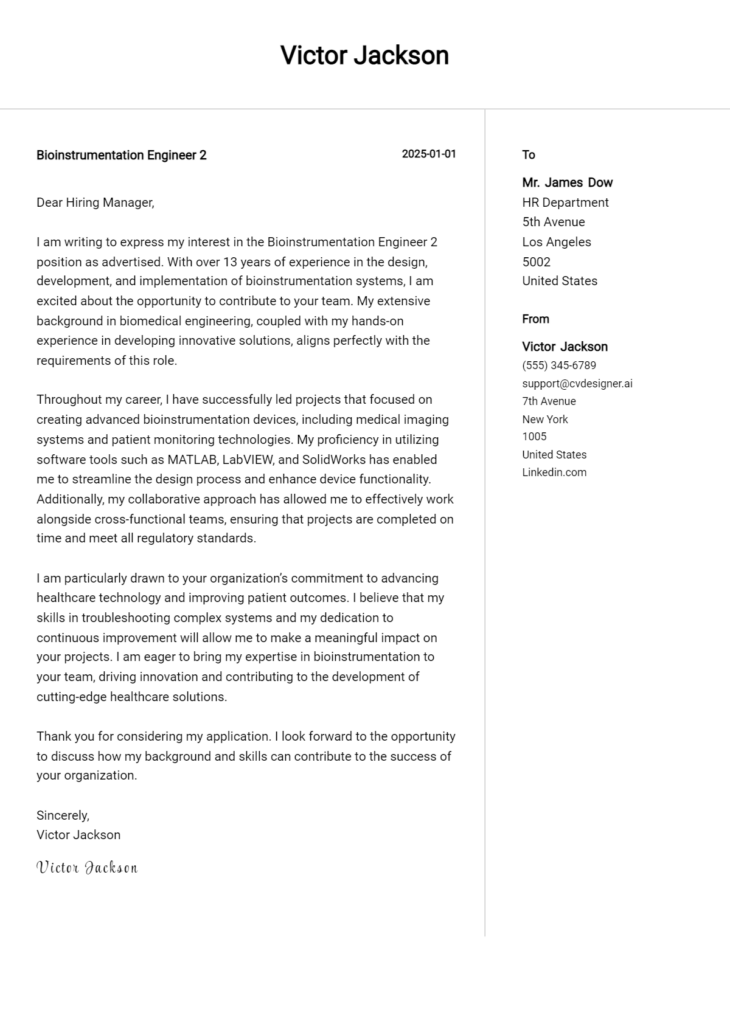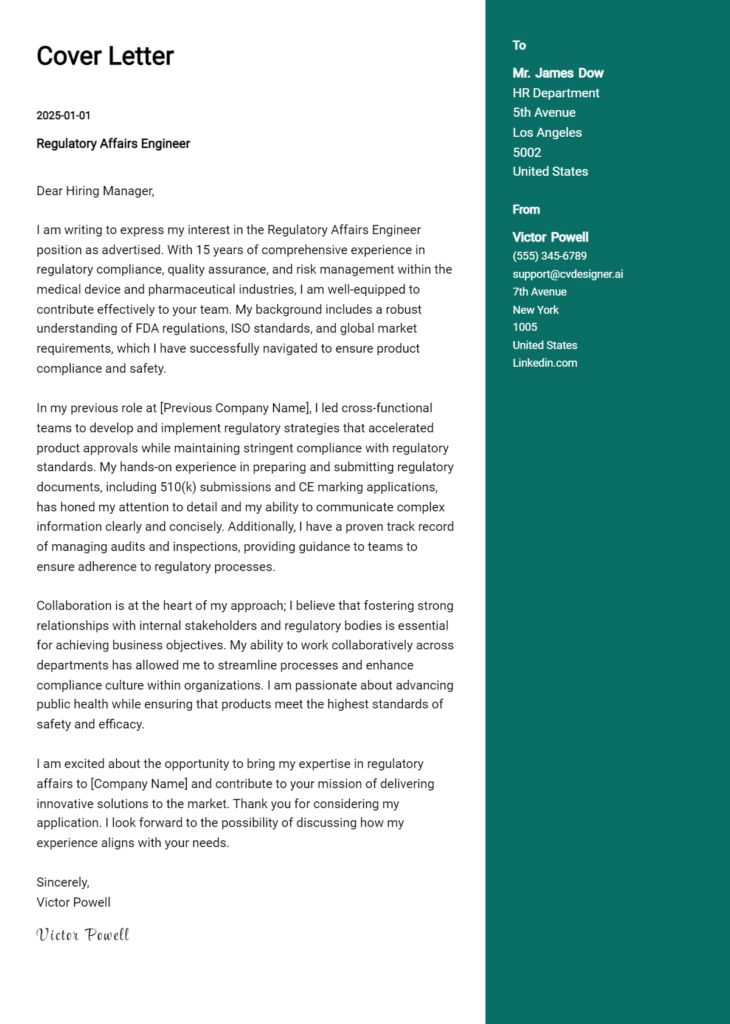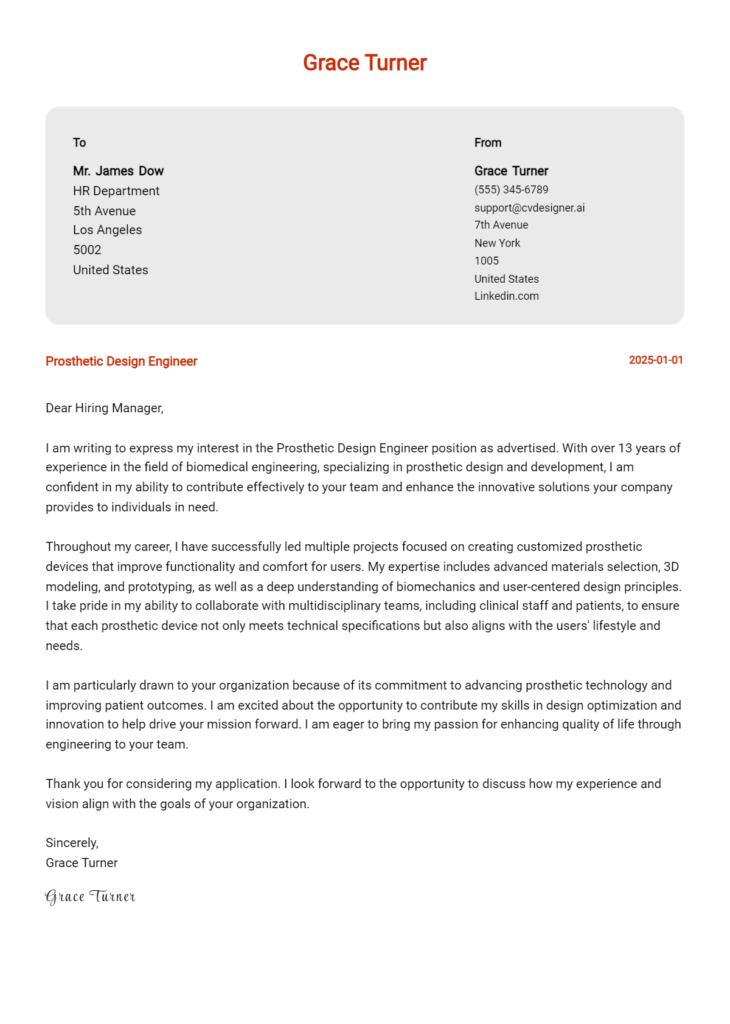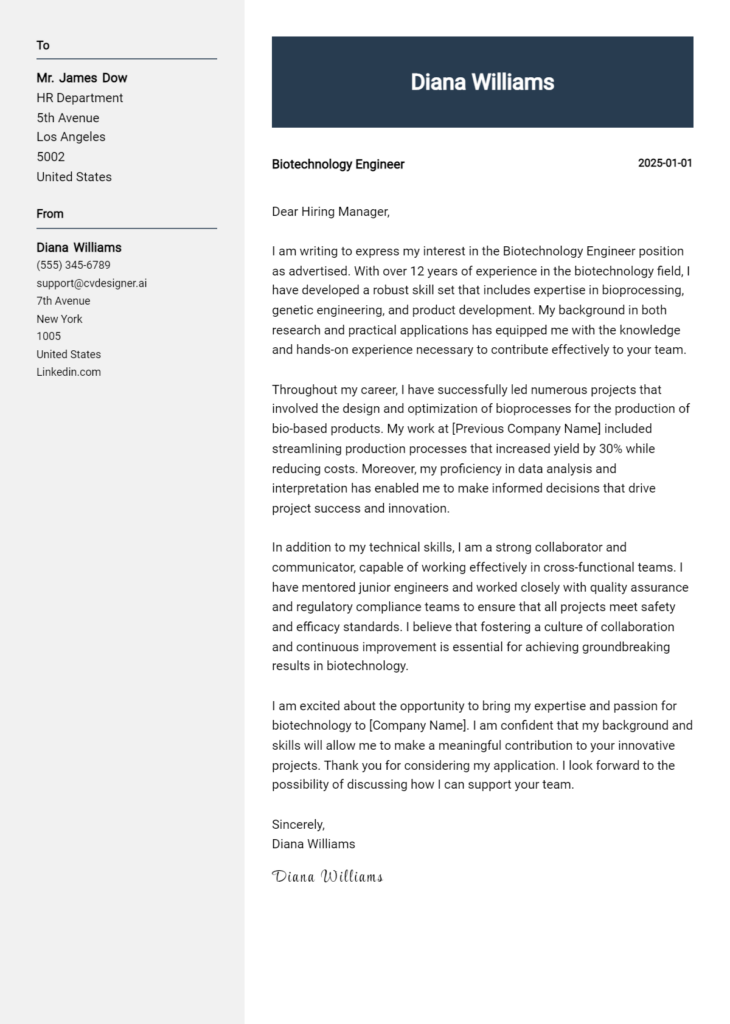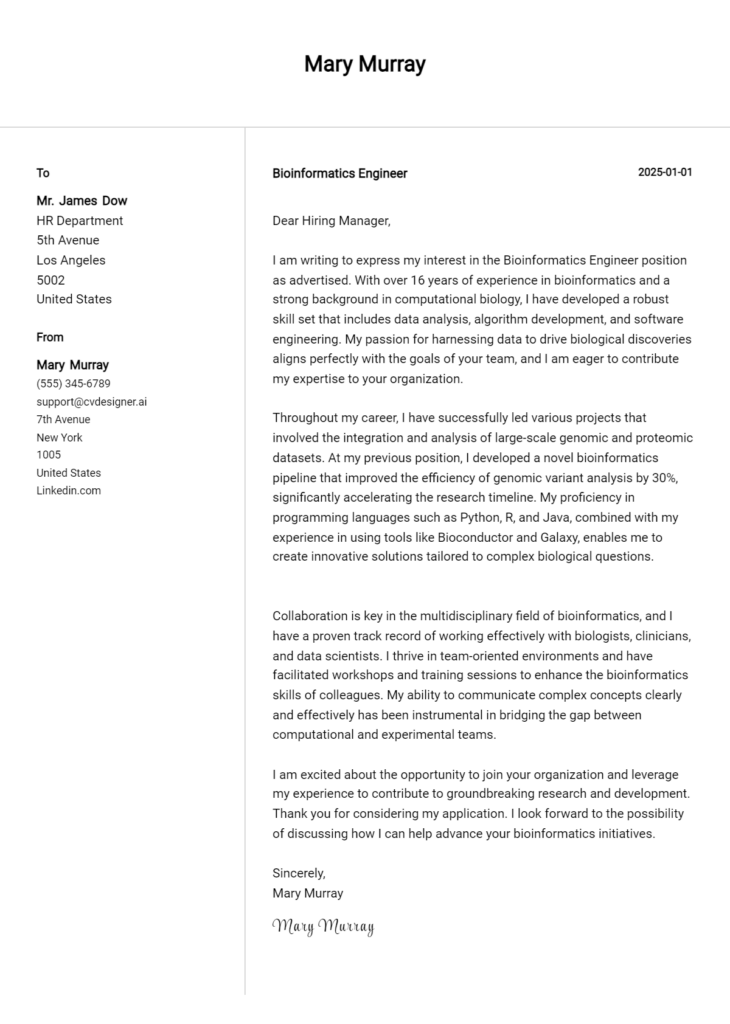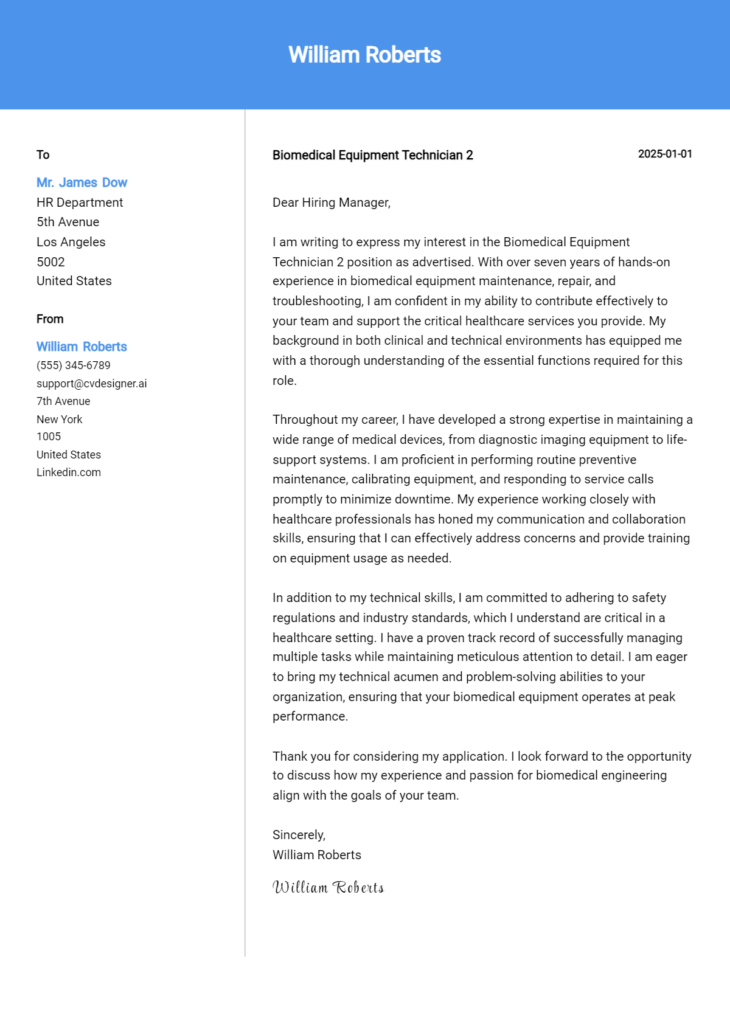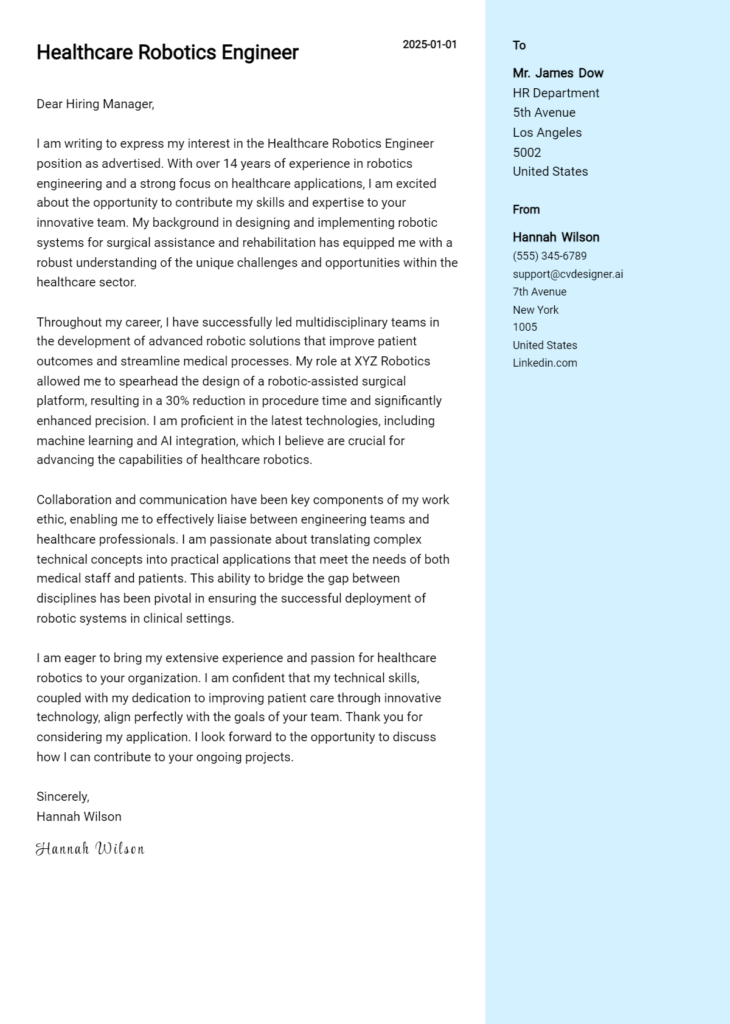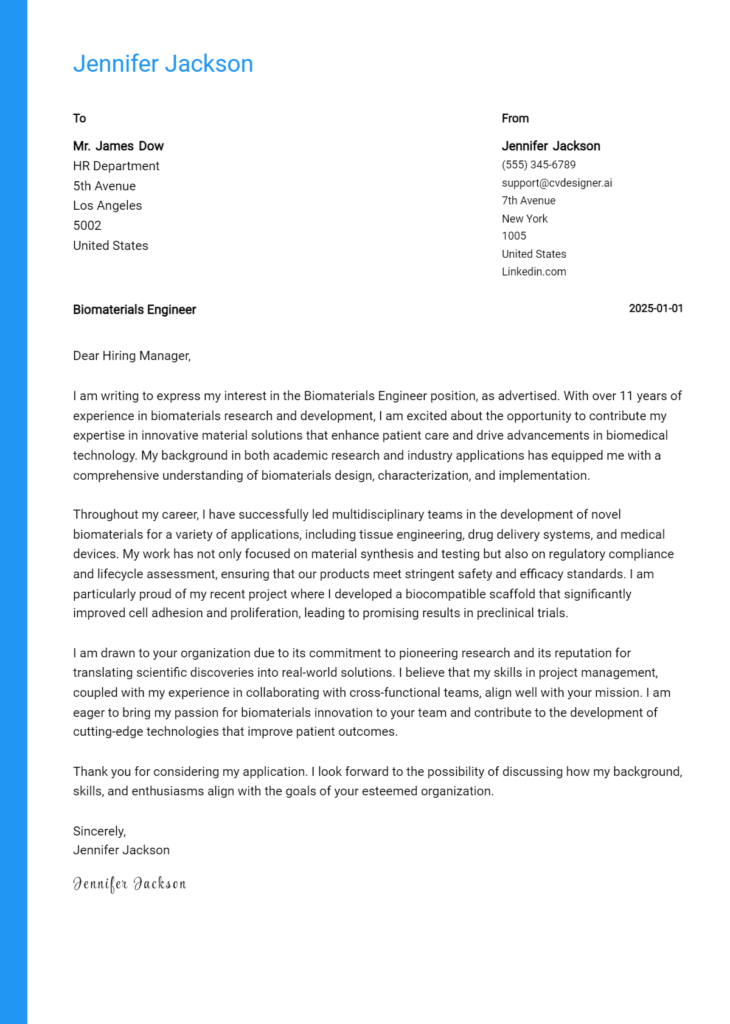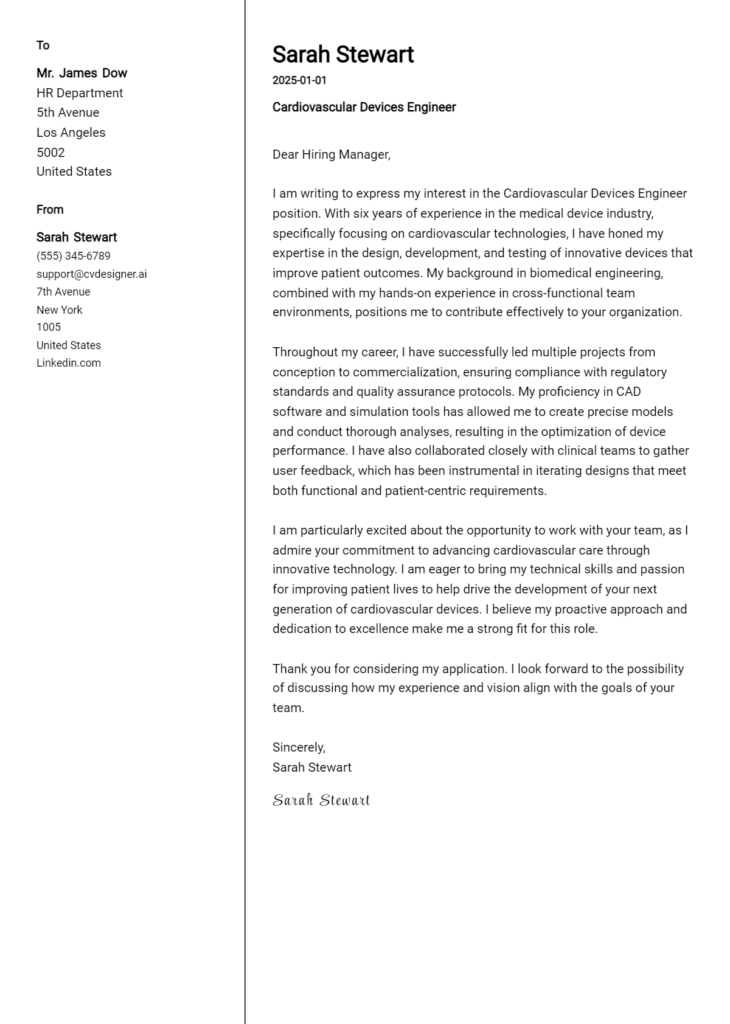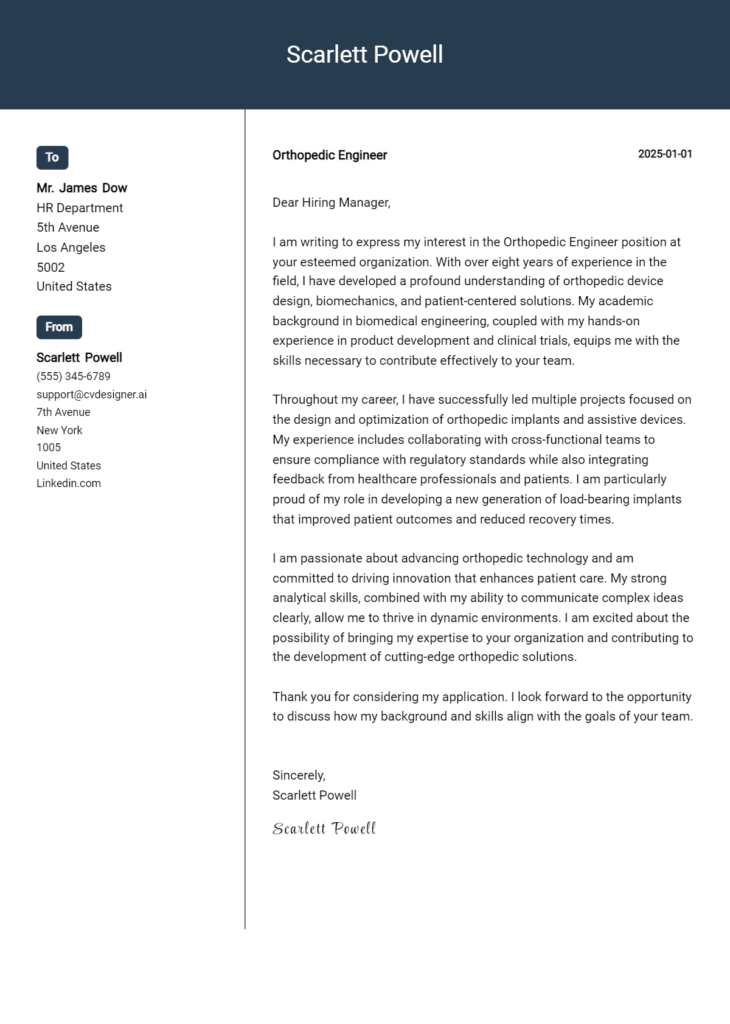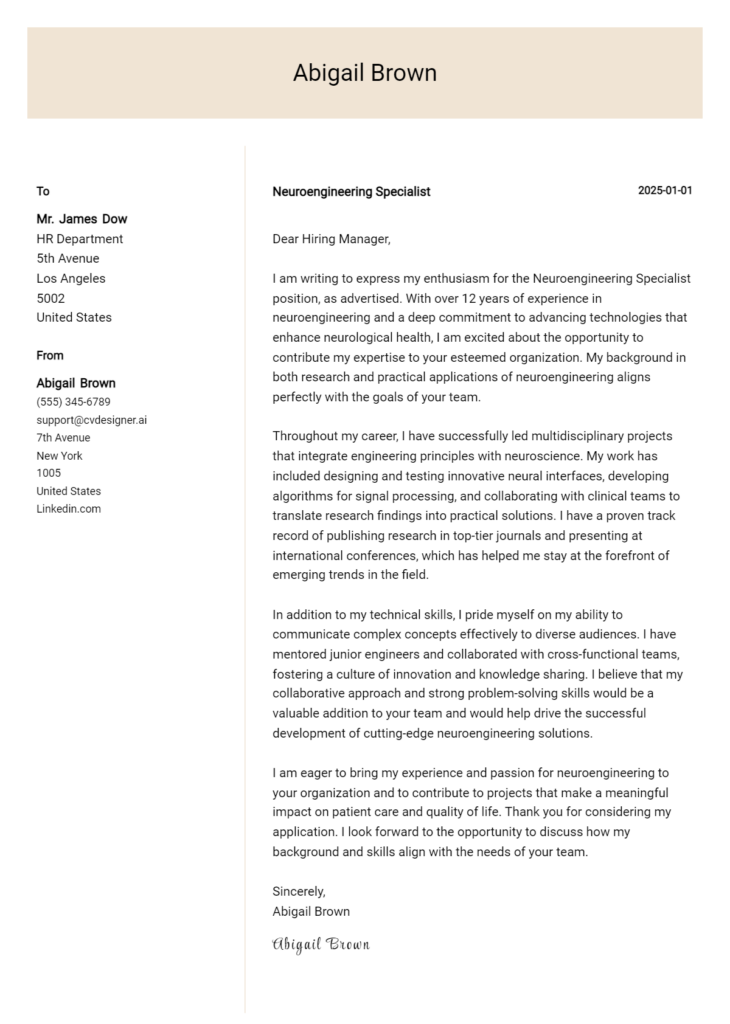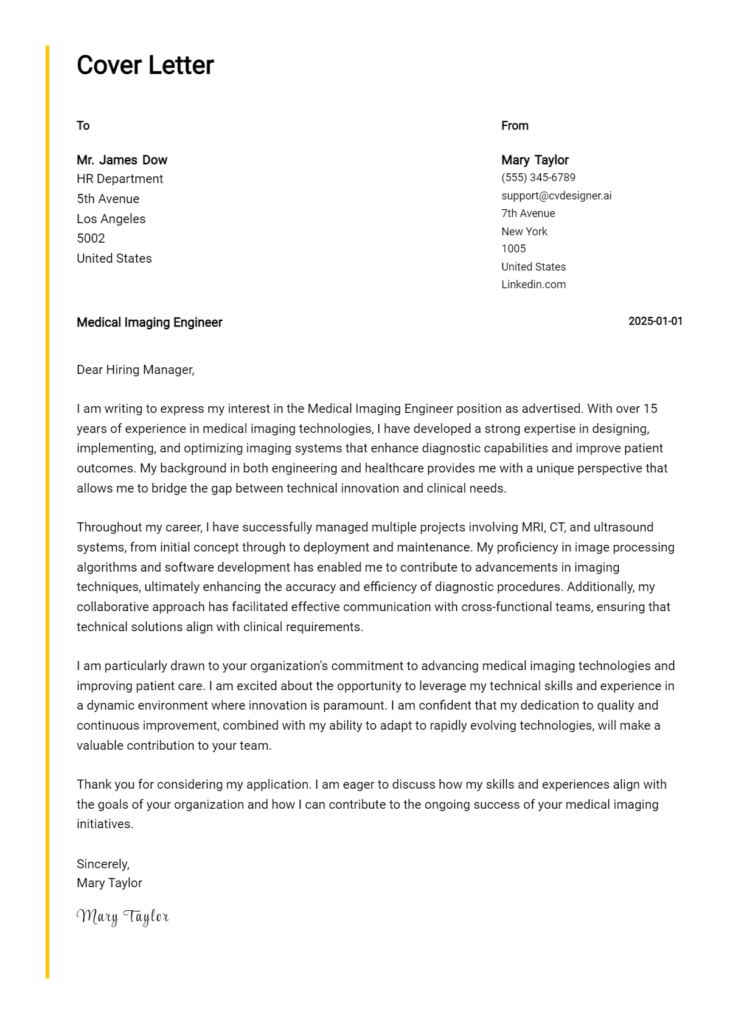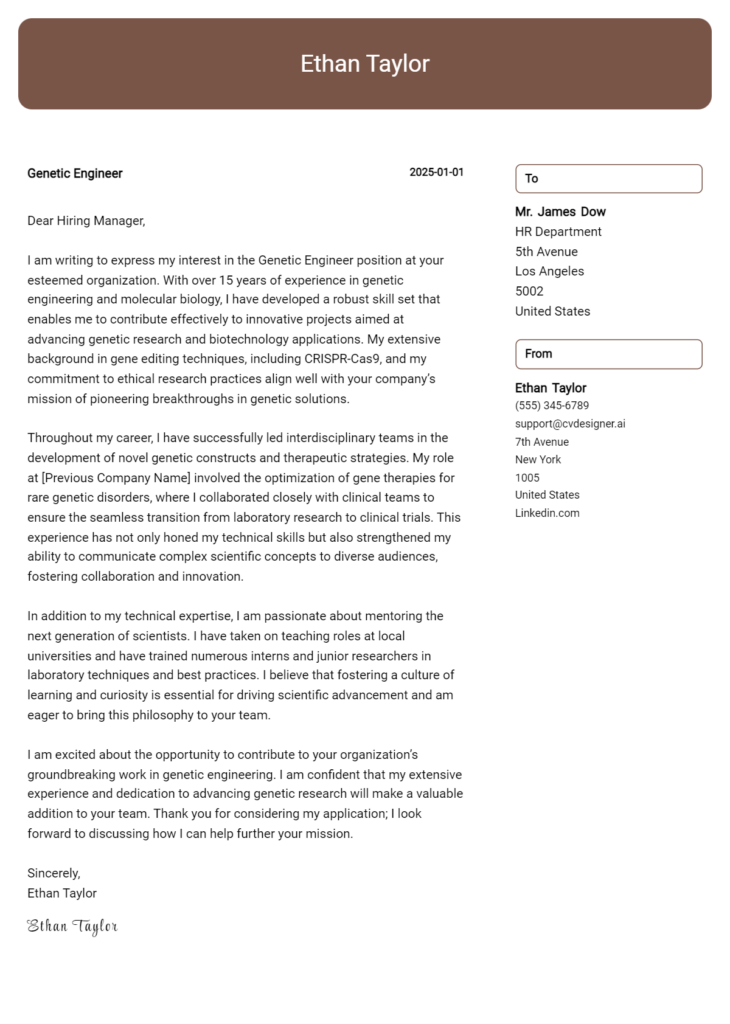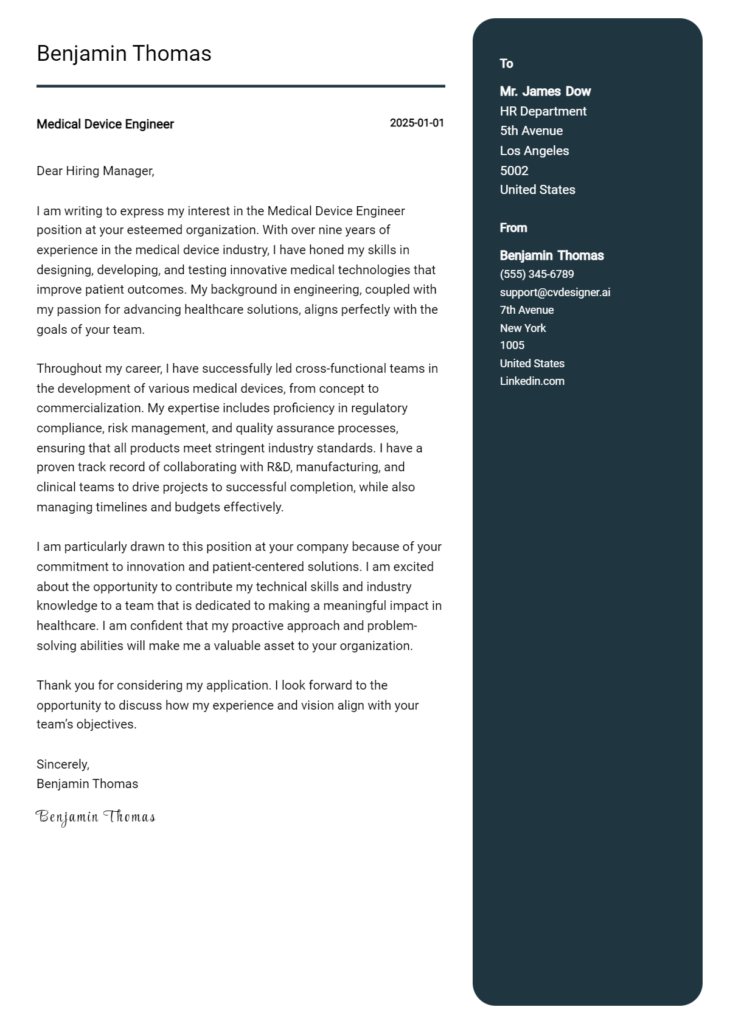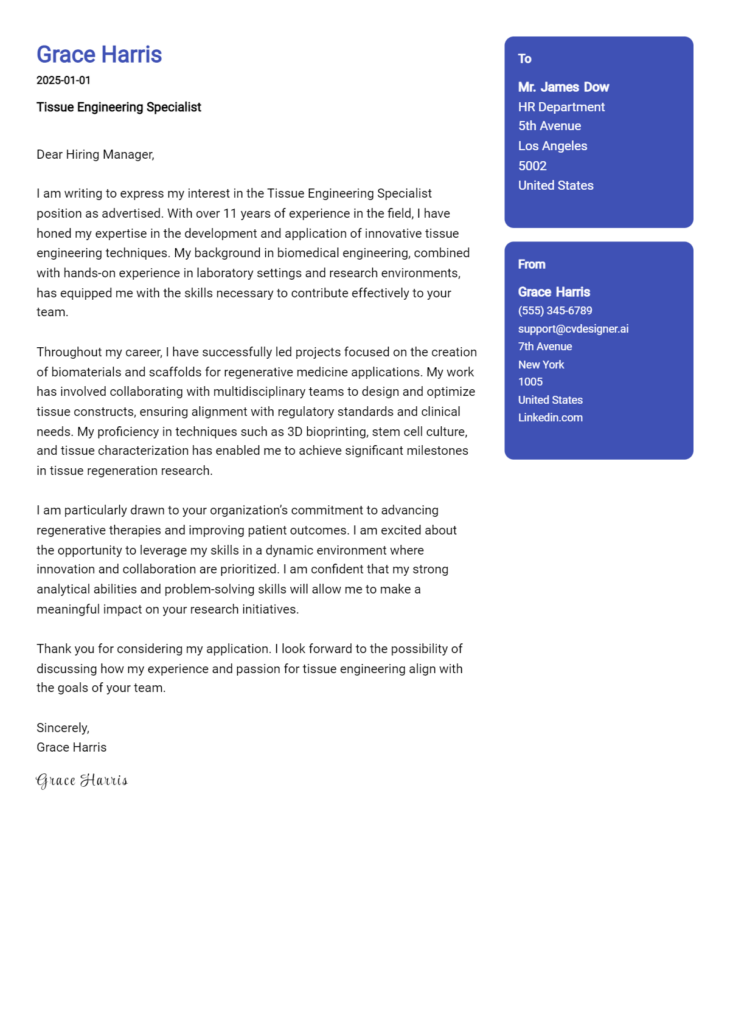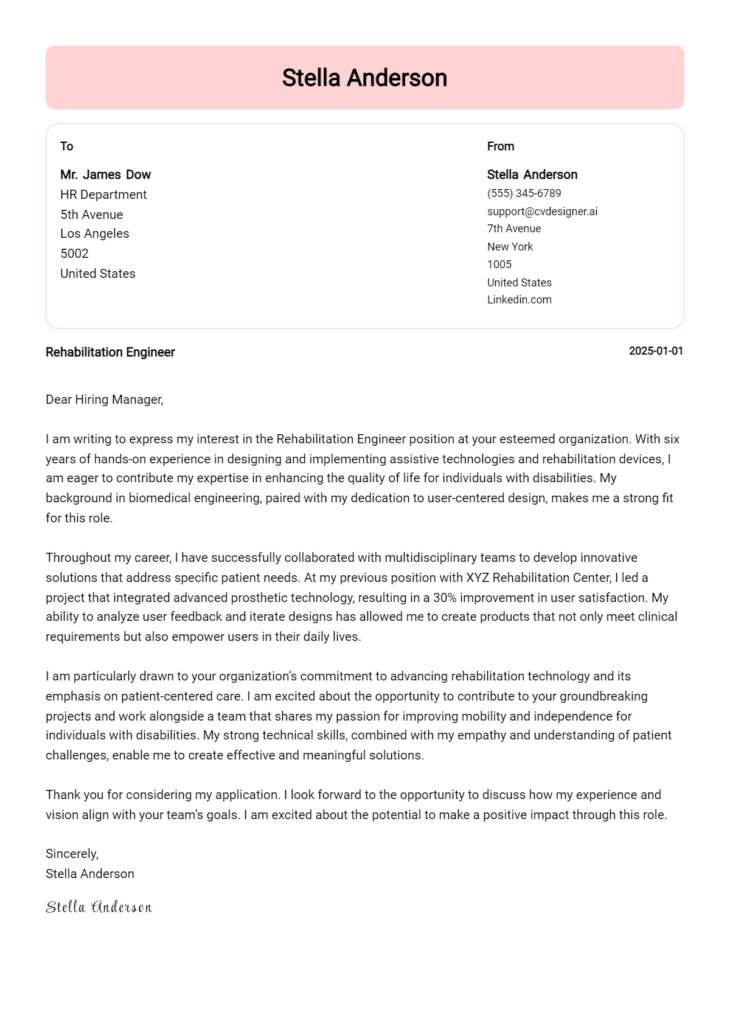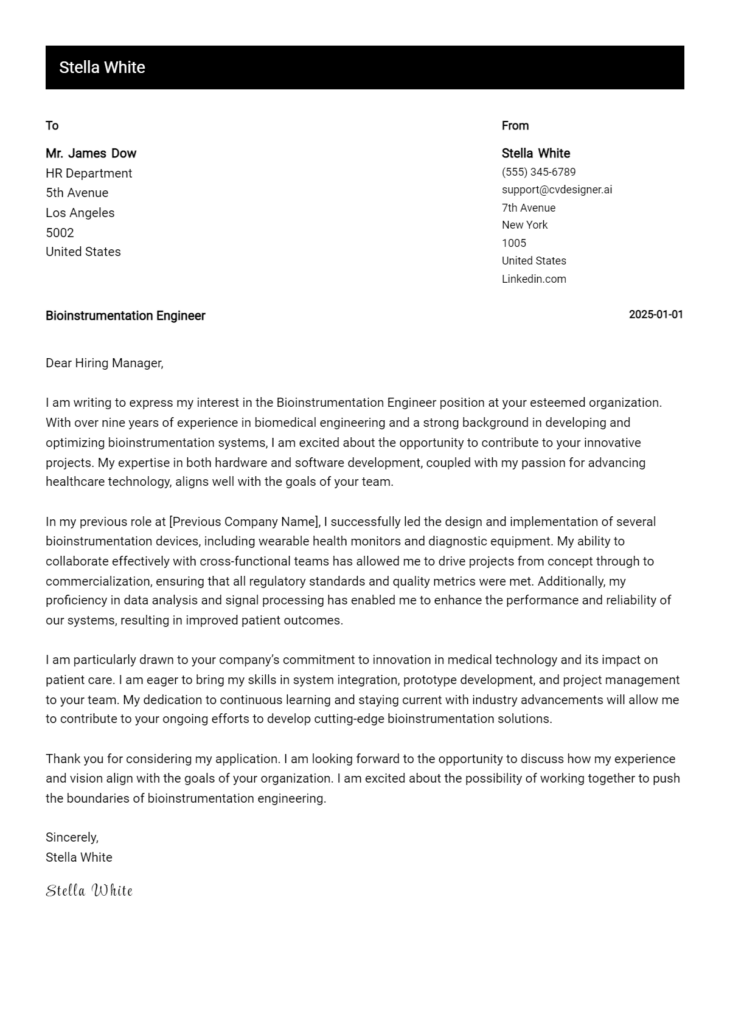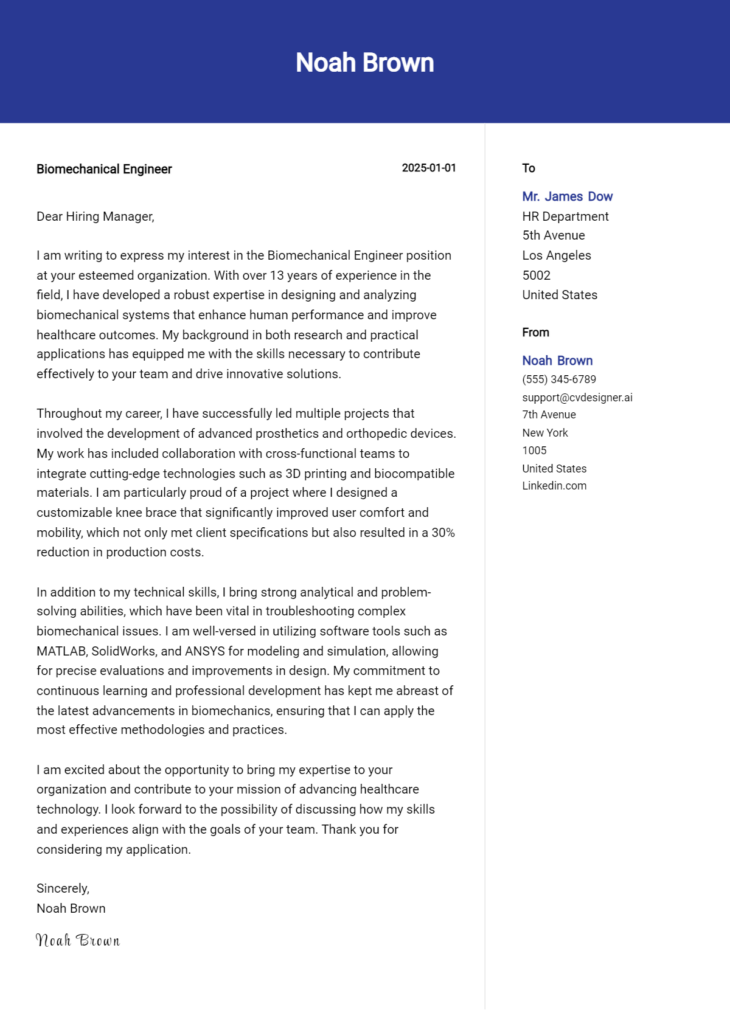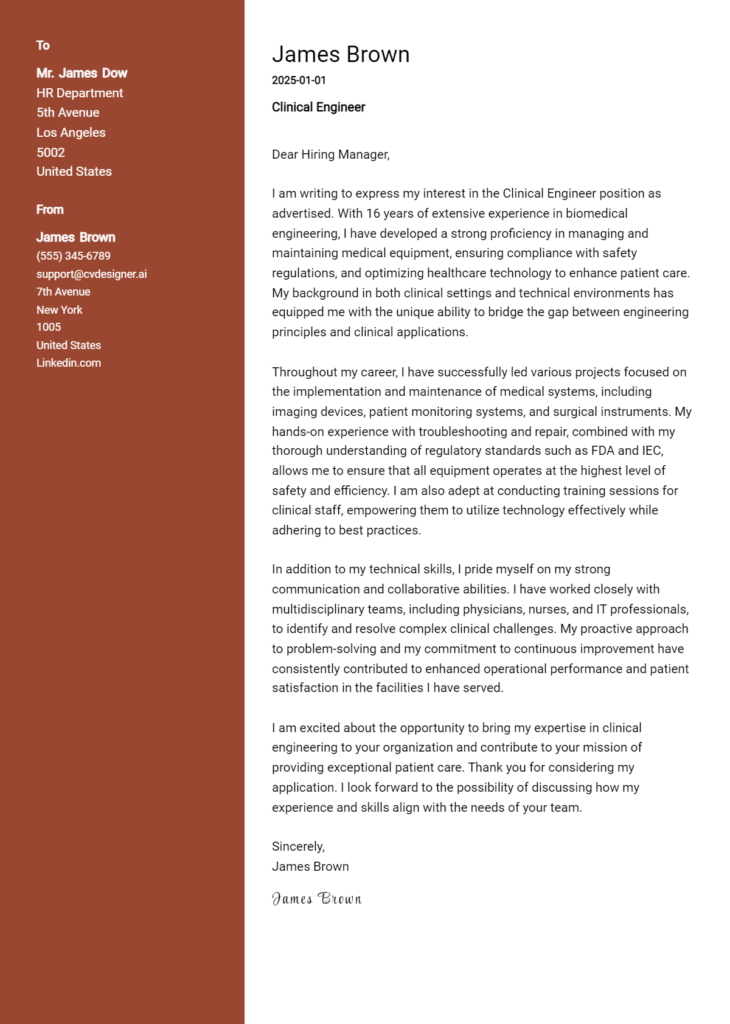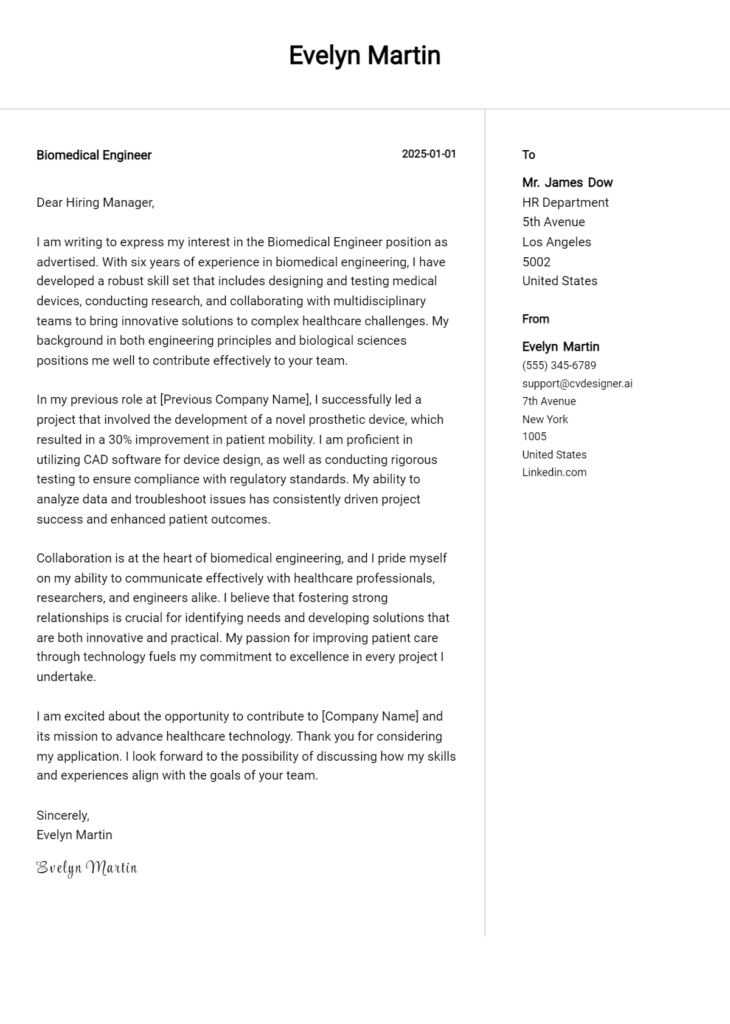Pharmaceutical Engineering Specialist Cover Letter Examples
Explore additional Pharmaceutical Engineering Specialist cover letter samples and guides and see what works for your level of experience or role.
How to Format a Pharmaceutical Engineering Specialist Cover Letter?
Crafting a compelling cover letter is essential for a Pharmaceutical Engineering Specialist, as it serves as your first impression on hiring managers. The way you format your cover letter not only communicates your qualifications but also reflects your understanding of the pharmaceutical industry's standards for precision and adherence to regulations. A well-structured cover letter can highlight your technical expertise and problem-solving skills, which are crucial in this field.
In this guide, we will explore how to effectively structure your cover letter, providing valuable insights and industry-specific examples to help you create a standout document.
We will focus on the essential components of a professional cover letter, including:
- Cover Letter Header
- Cover Letter Greeting
- Cover Letter Introduction
- Cover Letter Body
- Cover Letter Closing
Each section is critical for showcasing your qualifications and professionalism. Let’s delve into each part and learn how to make your cover letter truly resonate with potential employers in the pharmaceutical industry.
Importance of the Cover Letter Header for a Pharmaceutical Engineering Specialist
The cover letter header is a critical component of any job application, particularly for a Pharmaceutical Engineering Specialist. It sets the tone for your application, establishing an immediate impression of professionalism and attention to detail. A well-structured header should include your contact information, the date, and the recipient's details. This clarity not only helps the hiring manager identify your application but also reflects your organizational skills—an essential trait in the pharmaceutical industry.
A strong header conveys professionalism and ensures that your cover letter is taken seriously, while a weak header can detract from your qualifications and may even result in your application being overlooked. Below are examples of a strong and weak cover letter header.
Strong Example
John Doe 123 Pharmaceutical Lane Science City, ST 12345 (123) 456-7890 johndoe@email.com October 1, 2023 Hiring Manager Pharma Innovations Inc. 456 Industry Drive Pharma Town, ST 67890
Weak Example
johndoe@email.com 10/1/23 Dear Sir or Madam,
The Importance of a Cover Letter Greeting
The greeting of a cover letter serves as the first impression and sets the tone for the rest of the document. A well-crafted greeting not only demonstrates professionalism but also shows that you have taken the time to personalize your application. By addressing the hiring manager directly, you create a connection that can engage the reader and encourage them to continue reading. Avoiding generic greetings, such as "To Whom It May Concern," is crucial, as it can come across as impersonal and lazy. Instead, take the time to research the recipient's name through company websites or LinkedIn profiles to ensure your greeting is tailored and sincere.
When crafting your greeting, consider the following tips:
- Always use the hiring manager's name if it is available.
- Avoid overly casual greetings that may seem unprofessional.
- If the name is not available, consider using a title or department, but it's best to avoid generic salutations.
Strong Greeting Example
Dear Dr. Smith,
Weak Greeting Example
To Whom It May Concern,
Importance of a Strong Cover Letter Introduction for a Pharmaceutical Engineering Specialist
A well-crafted cover letter introduction is crucial for a Pharmaceutical Engineering Specialist, as it serves as the first impression to the hiring manager. This opening paragraph should not only capture attention but also express genuine interest in the role while showcasing relevant skills and achievements that set the candidate apart. A compelling introduction can spark curiosity and encourage the hiring manager to read further, while a lackluster one may lead to a quick dismissal. Below are examples of both strong and weak cover letter introductions.
Strong Example
Dear [Hiring Manager's Name], I am excited to apply for the Pharmaceutical Engineering Specialist position at [Company Name], as I am passionate about driving innovation in drug development and manufacturing. With over five years of experience in process optimization and regulatory compliance, I have successfully led cross-functional teams to implement cutting-edge technologies that improved production efficiency by 30%. I am eager to bring my expertise in quality assurance and project management to your esteemed team, contributing to the advancement of life-saving therapies.
Weak Example
To whom it may concern, I am writing to apply for the Pharmaceutical Engineering Specialist job. I have some experience in the field, and I think I could do a decent job. I have worked on a few projects and have a basic understanding of the processes involved. I hope you find my application interesting.
Purpose of the Cover Letter Body for a Pharmaceutical Engineering Specialist
The body of a cover letter for a Pharmaceutical Engineering Specialist serves to articulate the candidate's relevant skills and experiences while demonstrating their potential value to the company. It is an opportunity to highlight specific projects, accomplishments, and contributions that relate directly to the position at hand. By providing concrete examples of past work, such as successful drug formulation processes, process optimization initiatives, or regulatory compliance achievements, the candidate can effectively illustrate their technical expertise and problem-solving abilities. This section should resonate with the company's goals, ultimately making a compelling case for why the candidate is the ideal fit for the role.
Strong Example
As a Pharmaceutical Engineering Specialist at XYZ Pharma, I led a team project that successfully reduced the production costs of our flagship medication by 20% through the implementation of a new automated formulation process. This initiative not only improved efficiency but also maintained compliance with FDA regulations, resulting in a smoother approval process for our product line. My experience in cross-functional collaboration and my proficiency in Lean Six Sigma methodologies have equipped me with the skills necessary to drive continuous improvement and innovation within your organization.
Weak Example
I have worked in the pharmaceutical industry for a few years and have some experience with various projects. I am good at following instructions and can work with a team. I think I would be a good fit for your company because I am interested in pharmaceutical engineering.
Importance of the Cover Letter Closing for a Pharmaceutical Engineering Specialist
The closing paragraph of a cover letter is crucial as it serves to summarize your qualifications, reiterate your interest in the Pharmaceutical Engineering Specialist role, and encourage the hiring manager to take the next step, such as reviewing your resume or scheduling an interview. A strong closing can leave a lasting positive impression, while a weak one may diminish the impact of the rest of your application.
Strong Example
Thank you for considering my application for the Pharmaceutical Engineering Specialist position. I am excited about the opportunity to contribute my extensive experience in pharmaceutical manufacturing and process optimization to your esteemed organization. I believe my background in regulatory compliance and my strong problem-solving skills make me a perfect fit for your team. I look forward to the possibility of discussing how I can help drive innovation and efficiency at your company. Please feel free to contact me to schedule a convenient time for an interview. Thank you once again for your time and consideration.
Weak Example
I hope you like my application. I think I could do the job okay. Let me know if you want to talk more about it.
These tips are designed to assist candidates in crafting an effective cover letter for the role of Pharmaceutical Engineering Specialist. A well-written cover letter can be a powerful tool to showcase your unique qualifications and passion for the industry. Highlighting your technical skills, problem-solving abilities, knowledge of the Software Development Life Cycle (SDLC), teamwork experience, and commitment to continuous learning will set you apart from other candidates. Use the following tips to ensure your cover letter captures the attention of hiring managers.
Tips for Writing a Cover Letter for Pharmaceutical Engineering Specialist
Showcase Your Technical Expertise
Clearly outline your technical skills relevant to pharmaceutical engineering, such as proficiency in specific software, understanding of regulatory compliance, and experience with quality assurance processes. Use concrete examples to demonstrate how these skills have contributed to successful projects in your previous roles.Emphasize Problem-Solving Abilities
Pharmaceutical engineering often involves complex challenges. Include examples that highlight your analytical thinking and problem-solving capabilities. Describe a specific situation where you identified an issue, developed a solution, and successfully implemented it. This will showcase your ability to tackle challenges head-on.Highlight Your Knowledge of SDLC
Discuss your familiarity with the Software Development Life Cycle and how it applies to pharmaceutical engineering. Mention any experiences where you participated in the SDLC, including planning, analysis, design, development, testing, deployment, and maintenance, to demonstrate your holistic understanding of the process.Illustrate Teamwork and Collaboration Skills
Collaboration is key in pharmaceutical engineering. Provide examples of how you've worked effectively within a team, perhaps during cross-functional projects. Highlight your ability to communicate clearly, share knowledge, and contribute to a positive team dynamic that leads to successful outcomes.Convey a Passion for Continuous Learning
The pharmaceutical industry is constantly evolving, making it essential to stay updated on the latest trends and technologies. Mention any professional development courses, certifications, or industry conferences you’ve attended. Express your eagerness to continue learning and adapting to new advancements, which reflects your commitment to excellence in your field.
For additional resources, you can explore various cover letter templates that can help you format your letter effectively, or use a cover letter builder to assist you in creating a polished and professional document tailored to the role of Pharmaceutical Engineering Specialist.
Common Mistakes to Avoid in a Pharmaceutical Engineering Specialist Cover Letter
Crafting a compelling cover letter is essential for standing out in the competitive field of pharmaceutical engineering. Avoiding common mistakes can significantly enhance your chances of making a positive impression. Here are some pitfalls to watch for:
Generic Greetings: Using a vague salutation like "To Whom It May Concern" can make your cover letter feel impersonal. Aim to find the hiring manager's name for a more tailored approach.
Lack of Specificity: Failing to reference specific skills or experiences that align with the job description can weaken your application. Always customize your letter to highlight relevant qualifications.
Repetition of the Resume: A cover letter should complement your resume, not reiterate it. Use this opportunity to elaborate on key experiences and demonstrate your passion for the role.
Neglecting Formatting: A poorly formatted cover letter can detract from your message. Ensure that you follow a clear cover letter format to enhance readability and professionalism.
Typos and Grammatical Errors: Simple mistakes can undermine your credibility. Always proofread your document, and consider using tools or asking others for feedback.
Overly Technical Language: While it's important to showcase your expertise, overly complex jargon can alienate readers. Strive for a balance between professionalism and accessibility.
Ignoring the Company Culture: Not researching the company’s values or culture can result in a mismatch. Tailor your letter to reflect how you align with the organization’s mission and vision.
By avoiding these mistakes, you can create a more effective cover letter that resonates with employers in the pharmaceutical industry. For inspiration, check out these cover letter examples to see how to effectively present your qualifications.
Cover Letter FAQs for Pharmaceutical Engineering Specialist
What should I include in my cover letter for a Pharmaceutical Engineering Specialist position?
In your cover letter, focus on highlighting your relevant education, skills, and experience specific to pharmaceutical engineering. Start with a strong introduction that conveys your enthusiasm for the role and the company. Include details about your academic background, such as degrees in pharmaceutical sciences or engineering, and any specialized training or certifications. Discuss your hands-on experience with processes like drug formulation, quality control, and regulatory compliance. Emphasize your problem-solving skills and ability to work in cross-functional teams, as collaboration is crucial in this field. Finally, conclude by expressing your eagerness to contribute to the company’s goals and how your expertise aligns with their mission.
How can I tailor my cover letter for a specific company?
To tailor your cover letter, start by researching the company’s mission, values, and recent projects in the pharmaceutical industry. This information will help you align your skills and experiences with their specific needs. Use the company’s language and terminology to demonstrate your familiarity with their work. Highlight any relevant experience that directly relates to the projects or products they are developing. For instance, if the company specializes in biologics, mention your experience with biologic drug development or related technologies. Personalizing your cover letter shows that you are genuinely interested in the position and have taken the time to understand the company’s unique challenges and goals.
How long should my cover letter be for a Pharmaceutical Engineering Specialist role?
Your cover letter should ideally be one page long, consisting of three to four paragraphs. This length allows you to convey your qualifications without overwhelming the reader. Start with a brief introduction that captures attention, followed by a paragraph detailing your relevant experience and skills. Use another paragraph to discuss specific accomplishments or projects that showcase your expertise in pharmaceutical engineering. Finally, conclude with a strong closing statement reiterating your interest in the position and your eagerness to contribute to the company. Remember to keep your writing concise and focused, using clear language to communicate your points effectively.
What common mistakes should I avoid in my cover letter?
Avoiding common mistakes can significantly enhance the effectiveness of your cover letter. Firstly, ensure that your letter is free of spelling and grammatical errors; these can create a negative impression. Secondly, do not use a generic template—personalization is key. Avoid vague phrases; instead, be specific about your experiences and how they relate to the job. Refrain from repeating your resume verbatim; instead, use the cover letter to elaborate on key achievements and skills. Lastly, be cautious with your tone; maintain professionalism while letting your personality shine through. By steering clear of these pitfalls, you can craft a compelling cover letter that stands out to employers.
Build your Cover Letter in minutes
Use an AI-powered cover letter builder and have your letter done in 5 minutes. Just select your template and our software will guide you through the process.

